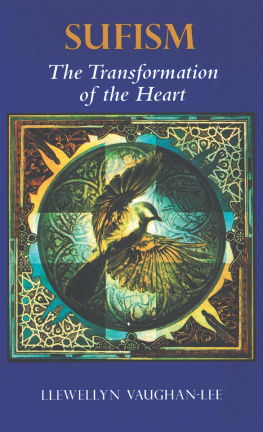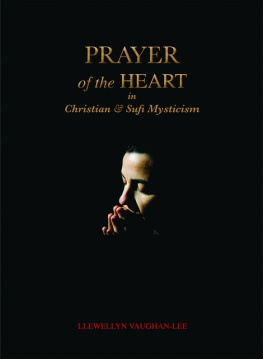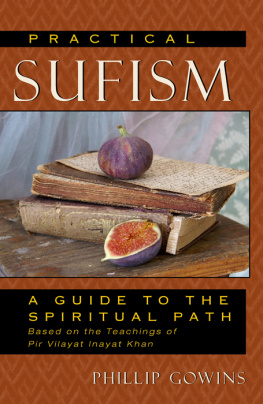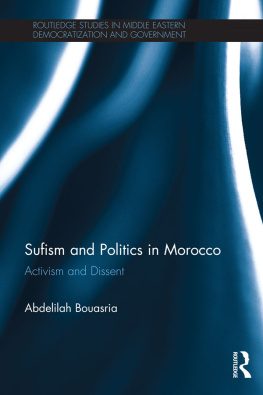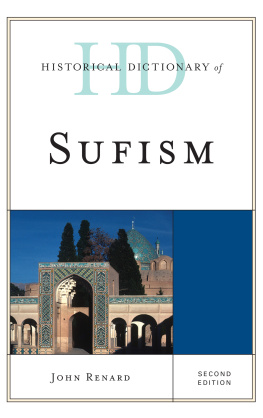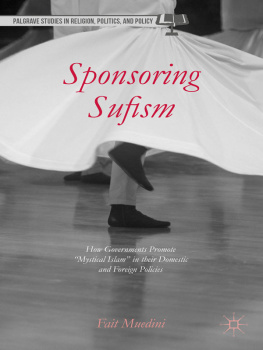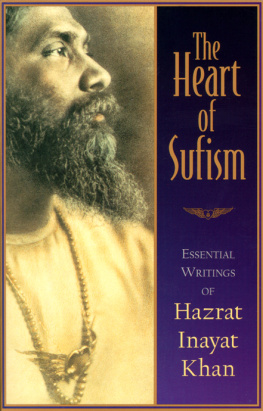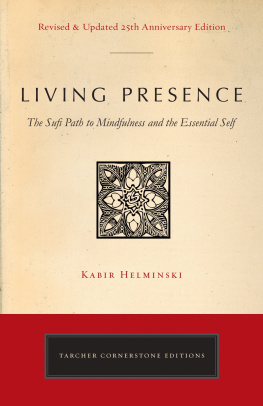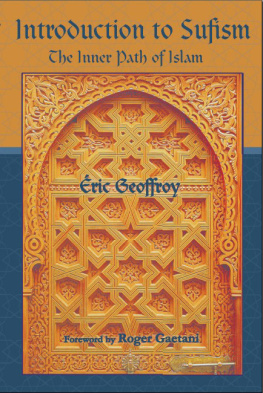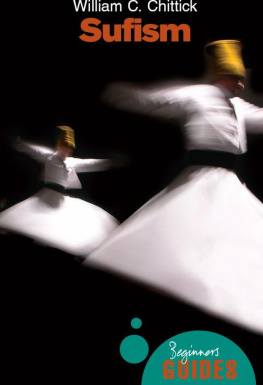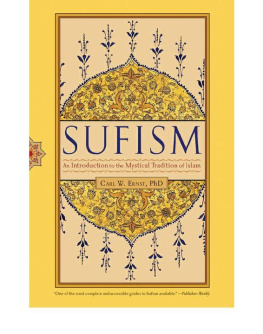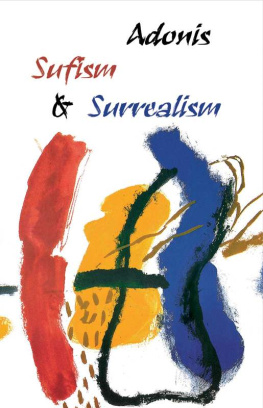
First published in the United States in 1995 by
The Golden Sufi Center
P.O. Box 456, Point Reyes, California 94956
1995, 2012 by The Golden Sufi Center
Fourth Printing, 2012.
All rights reserved.
No part of this book may be reproduced or utilized in any form or by any means, electronic or mechanical, without permission in writing from the Publisher.
Cover Illustration by Tennessee Dixon.
Printed and Bound by McNaughton & Gunn using recycled paper.
ISBN 10: 0-9634574-4-6
ISBN 13: 978-0-9634574-4-8
Library of Congress Cataloging-in-Publication Data
Vaughan-Lee, Llewellyn.
Sufism : the transformation of the heart / by Llewellyn Vaughan-Lee.
pages cm
Includes bibliographical references and index.
ISBN 978-0-9634574-4-8 (pbk. : alk. paper)
1. Sufism--Psychology. I. Title.
BP189.65.P78V38 2012
297.4--dc23
2012003305
CONTENTS
Index
PREFACE
Throughout this book, in an effort to maintain continuity and simplicity of text, the feminine pronoun is used for the seeker and the masculine pronoun is used for the teacher. Similarly, God, the Great Beloved, is referred to as He. Of course, the Absolute Truth is neither masculine nor feminine. As much as It has a divine masculine side, so It has an awe-inspiring feminine aspect.
In the end
a person tires of everything
except hearts desiring
souls journeying.
Rm
INTRODUCTION
Sufism is truth without form.
Ibn El-Jalali
THE JOURNEY FROM SEPARATION TO UNION
Sufism is a mystical path of love in which God, or Truth, is experienced as the Beloved. The inner relationship of lover and Beloved is the core of the Sufi path. Through love the seeker is taken to God. The mystic seeks to realize Truth in this life and God reveals Himself within the hearts of those who love Him.
The mystical experience of God is a state of oneness with God. This unio mystica is the goal of the traveller, or wayfarer, on the mystical path. Within the heart, lover and Beloved unite in loves ecstasy. The wayfarer begins the journey with a longing for this state of oneness. The longing is born from the souls memory that it has come from God. The soul remembers that its real Home is with God and awakens the seeker with this memory. The spiritual journey is a journey that takes us back Home, from separation to union. We have come from God and we return to God.
The mystical journey Home is a journey inward, to the very center of our being, where the Beloved is eternally present. He whom we seek is none other than our own eternal nature. Saint Augustine said, Return within yourself, for in the inward man dwells Truth. The mystic experiences that the Beloved dwells within the mystics heart, not as a concept but as a living reality. In the depths of the heart there is no separation between the lover and the Beloved. Here we are eternally united with God, and the mystical experience of union is a revelation of what is always present.
The greatest obstacle that keeps us from experiencing this eternal state of union is the ego, our own personal identity. In the state of union there is no ego. In this moment the individual self ceases to exist and only the Beloved exists. The Sufi says, The Beloved is living, the lover is dead. Thus the Sufi aspires to die before death, to transcend the personal self and experience our transcendent divine nature. The eleventh-century Sufi, Ansr, expressed this very simply:
Know that when you learn to lose yourself, you will reach the Beloved. There is no other secret to be learnt, and more than that is not known to me.
The mystical journey leads us away from the ego towards the Self, from separation back to union. Turning away from the ego and turning back to God, we are led deep within ourself, to the innermost center of our being, what the Sufis term the heart of hearts. This is an individual journey of the seeker back to the source, of the alone to the Alone. Yet there are stages on this journey, valleys of the quest, through which each traveller passes. The Sufi masters have provided us with a map describing these stages and also the difficulties and dangers of the path. Having reached the goal, they are able to help other wayfarers by recording what may be expected along the way.
Sufism also provides certain techniques to open us to the inner world and keep our attention focused on our invisible goal. Foremost among these is the practice of remembrance, for the Sufi aspires to remember God in every moment, with each and every breath. This is not a mental remembrance, but a remembrance of the heart, for it is the heart which holds the higher consciousness of the Self. The Self is the part of us which is never separate from God, and the consciousness of the Self is a quality of knowing that we are one with God. The practice of remembrance is a way of awakening the consciousness of the Self, and thus becoming aware of our inner union with Him whom we love.
If you love someone you always think of him, and when the souls love for God is awakened within the heart, the lovers attention is turned towards the Beloved. The moment of spiritual awakening is tauba, repentance, which the Sufis describe as the turning of the heart. The moment of tauba is always an act of grace, a gift from the Beloved, but Sufism has developed techniques for keeping our attention on the souls love for God, on the hearts remembrance. One of these techniques is the dhikr, the repetition of one of the names of God. Through the practice of the dhikr the attention of the lover is turned towards God and the whole being of the lover becomes permeated with the joy of remembering the Beloved.
The Sufi path helps to make us aware of the divine consciousness of the Self that is found within the heart, and at the same time guides us away from the limited consciousness of the ego. The journey from the ego to the Self is the eternal journey of the soul, of the exile returning Home. In this world we have forgotten our real nature and identify with the ego. The journey Home frees us from the grip of the ego and the illusory nature of its desires. We are led to the real fulfillment that can only come from knowing what we really are, tasting the truth of our divine essence. When one Sufi master,
Every spiritual path leads the sincere seeker to the truth that can only be found within. The Sufi says that there are as many roads to God as there are human beings, as many as the breaths of the children of men. Because we are each individual and unique, the journey of discovering our real nature will be different for each of us. At the same time different spiritual paths are suited to different types of people. Sufism is suited to those who need to realize their relationship with God as a love affair, who need to be drawn by the thread of love and longing back to their Beloved.
THE ANCIENT WISDOM
Sufi is a name given to a band of mystics who are lovers of God. There is an ancient story about a group of lovers who were called Kamal Posh (blanket wearers), thought by some to be early Sufis. Their only individual possessions were their single blankets, which they wore during the day and wrapped around themselves at night. They went to every prophet. No one could satisfy them. Every prophet told them, do this or that, and they were not satisfied. One day Mohammed said that Kamal Posh men were coming and that they would arrive in so many days. They came on the day he said and, when they were with him, he only looked at them without speaking. They were completely satisfied. Why were they completely satisfied? Because he created love in their hearts. When love is created what dissatisfaction can there be?
Next page
